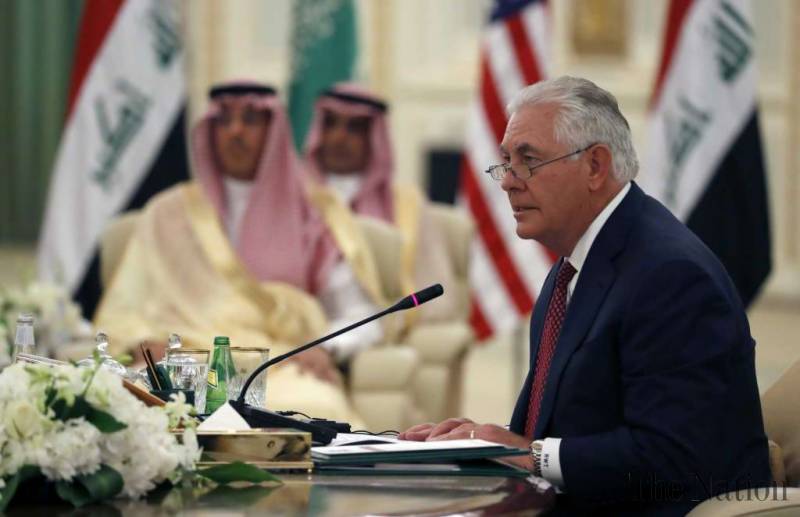US Secretary of State Rex Tillerson on Sunday promoted the Trump administration’s goal of uniting Saudi Arabia and Iraq in common cause to counter Iran’s growing regional influence.
Tillerson, who arrived in Riyadh on Saturday, participated in the inaugural meeting of the Saudi Arabia-Iraq Coordination Committee, along with Saudi King Salman and Iraqi Prime Minister Haider al-Abadi, telling the leaders that the event highlighted the improving ties between the longtime rivals and showed “the great potential” for further cooperation. He noted the August reopening of a major border crossing and the resumption of direct flights between Riyadh and Baghdad.
“Both represent the beginning of what we hope will be a series of even more tangible actions to improve relations and strengthen cooperation on a host of issues,” he said. “Your growing relationship between the kingdom and Iraq is vital to bolstering our collective security and prosperity and we take great interest in it.”
The United States is “grateful for this progress and urges you to expand this vital relationship for the stability of the region,” Tillerson said. “The United States stands ready to support continued cooperation between Saudi Arabia and Iraq, and we congratulate you.”
His participation in the meeting comes as US officials step up encouragement of a new axis that unites Saudi Arabia and Iraq as a bulwark against Iran’s growing influence from the Persian Gulf to the Mediterranean Sea. Amid the push for that alliance, the Iraqi government is struggling to rebuild recently liberated Islamic State strongholds and confronts a newly assertive Kurdish independence movement.
History, religion and lots of politics stand in Tillerson’s way, but both the Saudi king and the Iraqi prime minister appeared optimistic about the prospects.
“We are facing in our region serious challenges in the form of extremism, terrorism as well as attempts to destabilize our countries,” King Salman said. “These attempts require our full attention […] We reaffirm our support for the unity and stability of our brother country of Iraq.”
Abadi expressed pleasure with “the thriving relations between our two brotherly countries.”
“We are open and we want to move away from the past,” he said. “The region cannot tolerate any further divisions. Interference in the internal affairs of other state should stop.”
Earlier this month, on October 13, US President Donald Trump had launched a tougher strategy to check Iran’s “fanatical regime”, warning that a landmark international nuclear deal could be terminated at any time.
In a much-anticipated White House speech, Trump had stopped short of withdrawing from the 2015 accord, but “decertified” his support for the agreement and left its fate in the hands of Congress.
King Salman was among the first Gulf leaders to welcome Trump’s firm strategy towards Iran.
Trump’s tough-guy approach risks undoing years of careful diplomacy and increasing Middle East tensions.
Iranian President Hassan Rouhani had lashed out at his US counterpart, saying that he was opposing “the whole world” by trying to abandon the landmark nuclear agreement.








































admin in: How the Muslim Brotherhood betrayed Saudi Arabia?
Great article with insight ...
https://www.viagrapascherfr.com/achat-sildenafil-pfizer-tarif/ in: Cross-region cooperation between anti-terrorism agencies needed
Hello there, just became aware of your blog through Google, and found ...